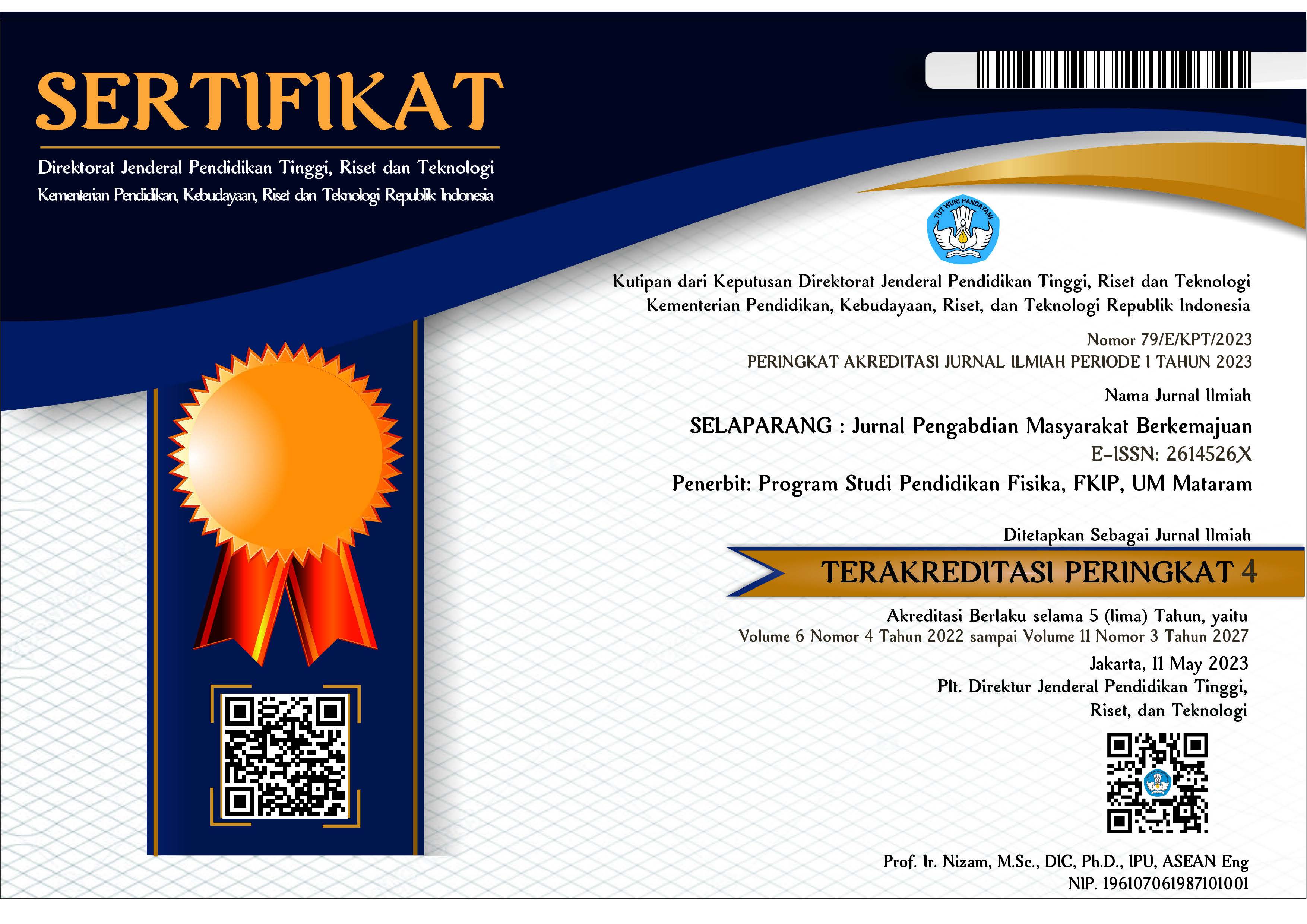Pengembangan pupuk organik berbasis kotoran kuda melalui pemberdayaan masyarakat di lingkungan bromo
Abstract
Abstrak
Desa Ngadisari, Kecamatan Sukapura, Probolinggo, menghadapi permasalahan keterbatasan akses pupuk anorganik dan tingginya limbah kotoran kuda akibat dominasi pertanian hortikultura dan pariwisata berbasis kuda. Permasalahan ini menyebabkan penurunan kualitas tanah serta pencemaran lingkungan. Kegiatan pengabdian masyarakat ini bertujuan meningkatkan kapasitas petani dalam mengelola limbah kotoran kuda menjadi pupuk organik sebagai solusi pertanian berkelanjutan. Mitra sasaran adalah kelompok tani dari tiga dusun di Desa Ngadisari, dengan jumlah peserta sebanyak 15 orang. Metode yang digunakan meliputi sosialisasi manfaat pupuk organik, edukasi teknik produksi berbasis praktik (experiential learning), demonstrasi lapangan, serta monitoring dan evaluasi melalui kuisioner pre-post pelatihan. Hasil kegiatan menunjukkan peningkatan pada motivasi, pengetahuan, dan keterampilan peserta dalam pembuatan pupuk organik, yang terkonfirmasi secara statistik melalui paired t-test (p < 0,001) dan effect size yang sangat besar. Korelasi antar variabel hasil evaluasi juga menunjukkan hubungan positif yang kuat antara pengetahuan dan keterampilan setelah pelatihan (r = 0,94). Secara kualitatif, peserta menunjukkan perubahan perilaku yang positif, kesiapan mengadopsi teknologi baru, serta tumbuhnya rasa percaya diri dan kemandirian dalam pengelolaan limbah organik. Program ini membuktikan bahwa model pelatihan partisipatif berbasis kebutuhan lokal efektif untuk mendukung transformasi sistem pertanian berkelanjutan dan dapat direplikasi di komunitas lain dengan permasalahan serupa.
Kata kunci: agroekosistem; difusi inovasi; experiential learning; petani hortikultura; sirkular ekonomi.
Abstract
Ngadisari Village, located in Sukapura District, Probolinggo, faces challenges related to limited access to inorganic fertilizers and the accumulation of horse manure waste, stemming from the predominance of horticultural agriculture and horse-based tourism. These issues have led to declining soil quality and environmental pollution. This community engagement program aimed to enhance farmers’ capacity to convert horse manure waste into organic fertilizer as a sustainable agricultural solution. The target partners were farmer groups from three hamlets in Ngadisari Village, with a total of 15 participants involved. The methods employed included socialization of the benefits of organic fertilizer, hands-on training in production techniques (experiential learning), field demonstrations, as well as monitoring and evaluation using pre- and post-training questionnaires. The results showed marked improvements in participants’ motivation, knowledge, and skills in producing organic fertilizer, as statistically confirmed by paired t-tests (p < 0.001) and a large effect size. Correlation analysis also revealed a strong positive relationship between knowledge and skills following the training (r = 0.94). Qualitatively, participants demonstrated positive behavioral changes, readiness to adopt new technologies, and increased confidence and independence in managing organic waste. This program demonstrates that a participatory training model tailored to local needs is effective in supporting the transformation toward sustainable agricultural systems and can be replicated in other communities facing similar challenges.
Keywords: agroecosystem; diffusion of innovation; experiential learning; horticultural farmers; circular economy.
Keywords
Full Text:
PDFReferences
Adugna, G. (2016). A review on impact of compost on soil properties, water use and crop productivity. Academic Research Journal of Agricultural Science and Research, 4(3), 93-104. https://doi.org/10.14662/ARJASR2016.010.
Aregaw, Y. G., Endris, E. A., & Bojago, E. (2023). Factors affecting the competence level of agricultural extension agents: A comprehensive analysis of core competencies in Northwestern Ethiopia. Education Research International, 2023(1), 7928467. https://doi.org/10.1155/2023/7928467.
Azim, K., Soudi, B., Boukhari, S., Perissol, C., Roussos, S., & Thami Alami, I. (2018). Composting parameters and compost quality: a literature review. Organic Agriculture, 8(2), 141-158. https://doi.org/10.1007/s13165-017-0180-z.
Bahrudin, B. (2022). Analisis kondisi sosial ekonomi masyarakat suku tengger di Desa Ngadisari Kecamatan Sukapura Kabupaten Probolinggo. Iqtishodiyah: Jurnal Ekonomi dan Bisnis Islam, 8(2), 98-105. https://doi.org/10.55210/iqtishodiyah.v8i2.785.
Cai, T., Steinfield, C., Chiwasa, H., & Ganunga, T. (2019). Understanding Malawian farmers' slow adoption of composting: Stories about composting using a participatory video approach. Land Degradation & Development, 30(11), 1336-1344. https://doi.org/10.1002/ldr.3318.
Dadashi, S., Sepanlou, M. G., & Mirnia, S. K. (2019). Influence organic compost compounds on soil chemical and physical properties. International Journal of Human Capital in Urban Management, 4(1), 15-22. https://doi.org/10.22034/IJHCUM.2019.01.02.
Dan, V., Osterheider, A., & Raupp, J. (2019). The diffusion of innovations in agricultural circles: An explorative study on alternative antimicrobial agents. Science Communication, 41(1), 3-37. https://doi.org/10.1177/1075547018819159.
Doran, E. M., Doidge, M., Aytur, S., & Wilson, R. S. (2022). Understanding farmers’ conservation behavior over time: A longitudinal application of the transtheoretical model of behavior change. Journal of Environmental Management, 323, 116136. https://doi.org/10.1016/j.jenvman.2022.116136.
Kästner, M., & Miltner, A. (2016). Application of compost for effective bioremediation of organic contaminants and pollutants in soil. Applied Microbiology and Biotechnology, 100(8), 3433-3449. https://doi.org/10.1007/s00253-016-7378-y.
Krasilnikov, P., Taboada, M. A., & Amanullah. (2022). Fertilizer use, soil health and agricultural sustainability. Agriculture, 12(4), 462. https://doi.org/10.3390/agriculture12040462.
Mihai, F.-C. (2023). Circular economy and sustainable rural development. Sustainability, 15(3), 2139. https://doi.org/10.3390/su15032139.
Mutuku, R. K. (2019). Relative advantage, perceived usefulness, and social influence are the main precursors that drive adoption of e-government among the youth in Kenya. International Journal of Humanities & Social Science Studies, 5(2), 94-121. https://doi.org/ 10.29032/ijhsss.v5.i2.2019.94-121.
Okumah, M., Martin-Ortega, J., Chapman, P. J., Novo, P., Cassidy, R., Lyon, C., Doody, D. (2021). The role of experiential learning in the adoption of best land management practices. Land Use Policy, 105, 105397. https://doi.org/10.1016/j.landusepol.2021.105397.
Pahlevy, F. N., Apriyanto, B., & Astutik, S. (2019). Karakteristik sosial ekonomi masyarakat daerah wisata Bromo sebagai pengembangan kesejahteraan hidup. Majalah Pembelajaran Geografi, 2(2), 111-130.
Pradana, A. P., Hariyati, Y., Winarso, S., Sudarko, S., Sofia, S., Jadmiko, M. W., & Savitri, D. A. (2023). Implementasi teknologi biointensif dalam rangka meningkatkan kesehatan tanaman dan menekan residu pestisida pada produk hortikultura di Desa Ngadisari-Probolinggo. Selaparang: Jurnal Pengabdian Masyarakat Berkemajuan, 7(1), 353-359. https://doi.org/10.31764/jpmb.v7i1.13312.
Prajapati, C. S., Priya, N. K., Bishnoi, S., Vishwakarma, S. K., Buvaneswari, K., Shastri, S., Jadhav, A. (2025). The role of participatory approaches in modern agricultural extension: bridging knowledge gaps for sustainable farming practices. Journal of Experimental Agriculture International, 47(2), 204-222. https://doi.org/10.9734/jeai/2025/v47i23281.
Sayara, T., Basheer-Salimia, R., Hawamde, F., & Sánchez, A. (2020). Recycling of organic wastes through composting: Process performance and compost application in agriculture. Agronomy, 10(11), 1838. https://doi.org/10.3390/agronomy10111838.
Sijabat, L. (2015). Analisis Gap Teknik Budidaya Petani Lokal Bawang Daun (Allium Fistulosum L), Kubis (Brassica Oleraceae), Dan Kentang (Solanum Tuberosum, L.) Di Kawasan Agroekologi Dataran Tinggi Bromo. Disertasi: Universitas Brawijaya.
Singh, B. (2018). Are nitrogen fertilizers deleterious to soil health? Agronomy, 8(4), 48. https://doi.org/10.3390/agronomy8040048.
Wulansari, D. F., Sofia, S., & Novikarumsari, N. D. (2023). Peran gender dalam kegiatan agriculture pada suku tengger di Desa Ngadisari Kecamatan Sukapura Kabupaten Probolinggo. Jurnal Bisnis Tani, 9(2), 54-64. https://doi.org/10.35308/jbt.v9i2.8654.
Wynne-Jones, S. (2017). Understanding farmer co-operation: Exploring practices of social relatedness and emergent affects. Journal of Rural Studies, 53, 259-268. https://doi.org/10.1016/j.jrurstud.2017.02.012.
DOI: https://doi.org/10.31764/jpmb.v9i5.33872
Refbacks
- There are currently no refbacks.

This work is licensed under a Creative Commons Attribution-ShareAlike 4.0 International License.
______________________________________________________
Jurnal Selaparang
p-ISSN 2614-5251 || e-ISSN 2614-526X
EDITORIAL OFFICE:



















